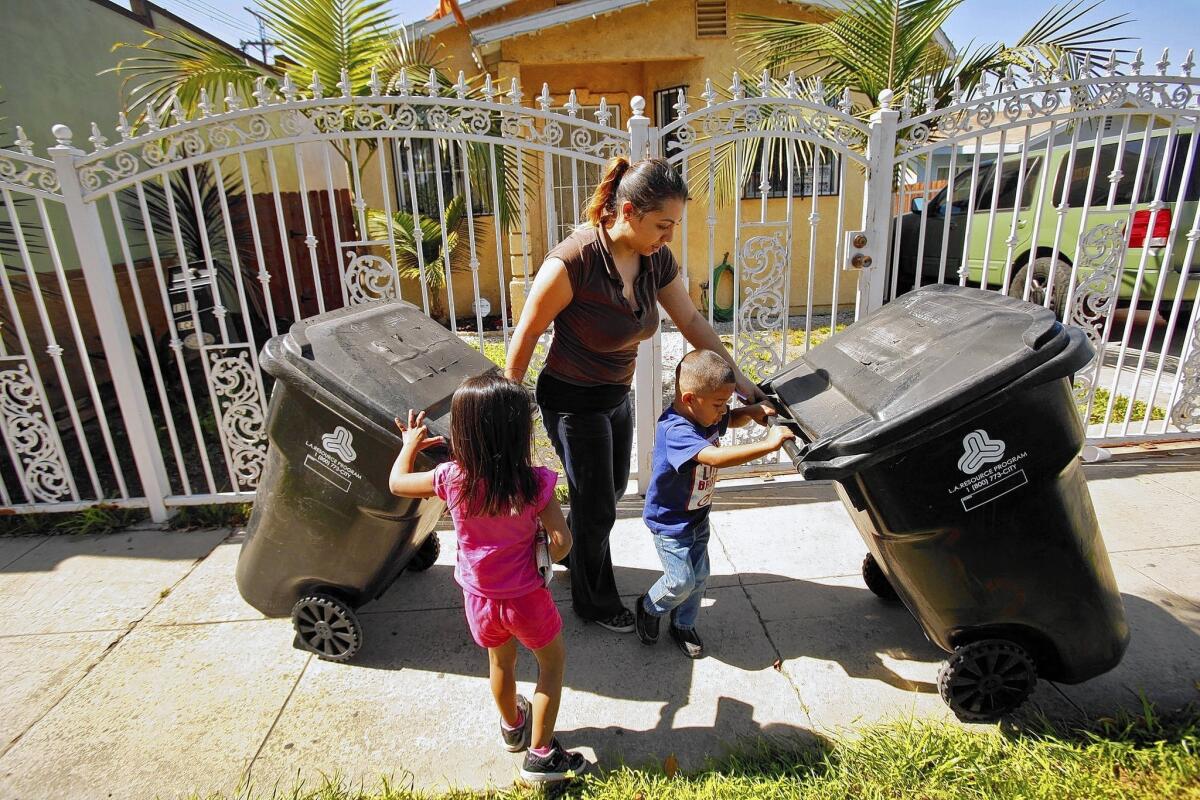Lead worries deepen near Exide plant in Vernon

- Share via
The first Zoila Meeks heard about pollution from a Vernon battery recycler was when workers showed up at her Boyle Heights home last month and asked to dig up her yard to test for lead.
They found it, and now Meeks and dozens of other residents in this quiet neighborhood of tree-lined streets tucked near the Los Angeles River are left wondering whether their health has been threatened, and what is going to happen to their homes.
“It’s very scary,” said Meeks, who has a 7-month-old daughter. Other neighbors said they were keeping their children inside, washing their hands repeatedly and worrying that health problems might be related to lead, a potent neurotoxin that is particularly harmful to children and pregnant women.
Earlier this week, officials with the state Department of Toxic Substances Control announced they had found elevated levels of lead in homes and a park near Exide Technologies. The state believes the lead pollution came from the Vernon plant.
State officials have stressed that those levels don’t necessarily pose an acute risk for adults living there, or even an indication that long-term exposure will be harmful.
Still, they say the presence of lead is a concern. They have been calling residents to tell them to keep children away from bare soil and take other precautionary measures.
Officials tested 19 homes in Meeks’ Boyle Heights neighborhood, and 20 more about two miles farther south in Maywood. Almost every home tested had levels of lead in the soil that exceeded 80 parts per million, the level at which California recommends further health-related evaluations. One home had samples above 580 parts per million.
The state has ordered additional testing in the neighborhood, as well as in nearby areas farther from the plant. They have told Exide it must come up with a plan in the next two weeks to protect people living in homes with elevated levels of lead in the soil.
For residents of La Puerta, Prado and Indiana streets in Boyle Heights, all that is little comfort.
“I’m worried about going to the park” with my children, said Sylvia Calderon, who is seven months pregnant and has three children ages 10, 7 and 4.
Two blocks away, Rosemary Morales said workers did not test her home because she rents, and they needed permission from the owner. But she said that as a precaution she had been keeping her children inside since Monday, when she read in the newspaper about the high levels of lead.
The plant is near several densely packed, working-class neighborhoods with large immigrant populations. Activists say it’s sometimes difficult to get residents organized.
But this issue has galvanized the communities. People have packed meetings, protested outside the plant and even traveled to Sacramento to lobby legislators for stricter environmental protections.
“It takes a lot to get the people moving,” said Teresa Marquez, president of the Boyle Heights Stakeholder Assn. and a member of Mothers of East Los Angeles. “Now they are.”
Assembly Speaker John Pérez (D-Los Angeles) said these neighborhoods have long dealt with environmental problems because of their proximity to the manufacturing and industrial plants of southeast L.A. County. Residents successfully fought plans for a power plant and an incinerator.
“Folks are fed up with our community being the dumping ground for all the ills,” he said.
State officials have refused to release details about lead levels at specific homes, citing privacy rules. They are planning a community meeting Wednesday to discuss the findings with residents.
One home had initial results above 1,000 parts per million, the level at which the soil would be considered a hazardous waste. Exide officials reanalyzed the sample, according to state records, and came up with a lower number.
State officials wrote the company this week that Exide “failed to adequately rationalize why the initial sampling effort is not representative” and ordered them to immediately reassess that property.
Exide officials, meanwhile, released a statement earlier this week in which they pledged to work cooperatively with the state to carry out additional testing.
“The health and safety of the community, as well as its workforce, are important to Exide and the company is committed to investing in the Vernon facility to further reduce emissions and protect public health,” officials said.
The contaminated soil is only the latest worry about Exide, one of just two lead acid battery smelters west of the Rocky Mountains. The plant, which opened in 1922, smelts up to 25,000 batteries a day.
Last year, the South Coast Air Quality Management District issued a study that found that arsenic emissions from the plant posed an elevated cancer risk to 110,000 people living nearby.
Officials did not find elevated levels of arsenic in the soil of any of the homes or the park.
Los Angeles County on Tuesday also waded into the fray, when the Board of Supervisors voted to create a toxic threat “strike team” to go after dangerous facilities. The team’s first target, the board voted, will be Exide.
Some residents living near the plant said they were pleased the state was taking action, but dismayed that it didn’t happen sooner.
The plant has been cited numerous times over the years for emitting too much lead.
“They have been around for years, polluting for years, and no one has done anything about it,” said Charles Gonzalez as he stood in his yard above a patch of grass that had recently been dug up and then replaced by workers testing the soil. In some parts they found lead above 200 parts per million, he said. “I can’t believe this has been going on for
years.”
More to Read
Sign up for Essential California
The most important California stories and recommendations in your inbox every morning.
You may occasionally receive promotional content from the Los Angeles Times.










